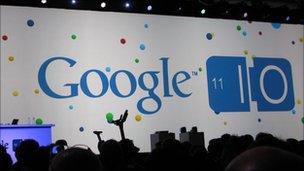Google Music stumbles at launch
- Published

Google faced developers and the media as it revealed the cloud music service at its IO conference
Google has been forced to scale back its plans for a cloud-based music service.
The company blamed lack of co-operation from the major record labels.
Its product, currently named Music Beta, will now launch in a scaled-down form.
Users in the US will be able to upload tracks from their personal collection to Google's servers and play them on Android smartphones and tablet devices.
The free service will feature enough space to store 20,000 songs.
Google announced its failure to strike the necessary deals at the company's annual developer conference in San Francisco.
The web firm said that business and product demands from some labels were too onerous
But it stressed that Music Beta was a totally legal service, and that the door had not been closed to future deals.
"We are open to discussion, as long as those discussions are aimed at creating a product and service for end-users that is on a sustainable set of business terms which represents a good value for users," Jamie Rosenberg, director of digital content for Android, told ģÉČËŋėĘÖ News.
"It is in our interest and in our plans to work with the music industry and sell their artists.
"What we are focused on now is that users have existing music collections they have spent time and money acquiring, and giving them access to that music wherever they want it."
Analysts have said there is little doubt that Google has been forced to scale back its ambitions.
"This is not the service they wanted to do, but it is the service they could do without running into all sorts of interference from the record labels," said Michael Gartenberg, senior analyst with research firm Gartner.
Despite its billing, Music Beta has fallen short of its creator's original aspirations
"It is a step forward, and at least consumers can get used to the idea of storing and accessing music via the cloud."
Half way house
Billboard magazine had reported that Sony Music Group and Universal Music Group proved to be the stumbling blocks in Google's hopes to offer a more fully-fledged service.
A number of industry watchers said the labels are ignoring the march of progress by being unable to broker deals with services such as those offered by Google, and also by Amazon through its Cloud Player product.
"This whole move to the cloud for music is inevitable, and there is this disconnect between what is possible on the internet and the old business models," said Tom Krazit of technology site PaidContent.com.
"At some point, someone will figure out how to make it work, but certainly no-one did today.
"I just think it underlines that the music labels don't really know what they are doing when it comes to the internet, the cloud and distribution. Certainly there is an opportunity there and they are not going after it."
That is also the view of Matt Rosoff, west coast editor for Business Insider, who said Music Beta will be a poorer service as a result.
"It is a half-way house, but I think it is a decent start and underlines that music is moving to the cloud," he said.
"The fact that Google wasn't able to sign up the labels means there are going to be some pain points.
"Uploading songs manually takes a long time - I have been told it takes as much as a day to upload 1,000 songs. The label deals would have make this much better."
Google has said there are a number of labels that are keen to be involved in Music Beta, and that they are working together to bring other features to the service.
Amazon's Cloud Player also lets users store and manage music collections online. It charges a fee for large amounts of storage.
Mr Gundotra said Google tries not to take itself too seriously
Apple is also expected to enter the fray by announcing an internet-hosted music service at its developer conference next month.
Everybody wins
At the Google IO conference, the company also announced some impressive figures regarding sales of Android-powered devices.
It revealed to a 5,000-strong developer audience that more than 100 million devices have been activated worldwide, and that 400,000-plus devices are being activated daily.
In addition, the company said that over 200,000 apps are available via the Android market.
In a sideswipe at Apple, Google displayed a visual of the Android logo eating a shiny red apple, indicating that the iPhone is losing out to Android.
"It's hard to believe a little more than two-and-a-half years ago we were just one device, launching in one country on one carrier," said Vic Gundotra, senior vice president of engineering.
Last month, research firm IDC projected that Android will capture nearly 40% of the global smartphone market by the end of the year.
Apple's iOS software is expected to come in at 16%, while BlackBerry will command a 15% market share.
In a session with reporters after the keynote speech, Mr Gundotra said the visual was a little bit of fun: "We try not to take ourselves too seriously. Its great to be in a battle for the hearts and minds of developers, and I think everybody wins."
- Published4 May 2011
- Published15 April 2011
- Published29 March 2011
- Published24 January 2011